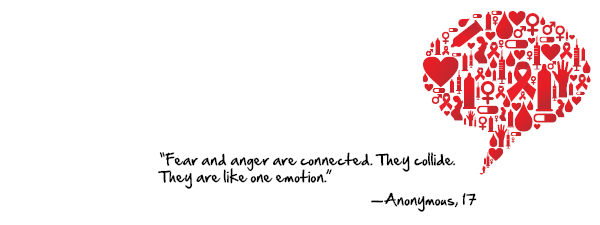 Your feelings can affect when and why you take your HIV medications. Both negative and positive emotions can affect how well you stick to your med schedule. It’s possible that you might not even realize the connection between your mood and taking your meds, but ask yourself the following questions:
Your feelings can affect when and why you take your HIV medications. Both negative and positive emotions can affect how well you stick to your med schedule. It’s possible that you might not even realize the connection between your mood and taking your meds, but ask yourself the following questions:
- When you’re in a good mood, do you tend to stick to your med schedule better?
- What about when you’re in a bad mood?
- When you feel depressed, angry, or have other negative feelings, is it difficult for you to take your meds on time every day?
Below you’ll find different strategies that you can use to prevent negative or positive moods from getting in the way of taking your medications.
Knowing your values
Knowing what’s important to you can help you take good care of yourself. All values and goals will be easier to achieve if you’re healthy. For example, if money is important to you, you have to be healthy enough to go to work. If you like to volunteer in your community, you won’t be able to do so if you’re sick. Check out these value cards and think about what matters to you.
Behavior activation – pleasant activities
Doing fun things is a way to begin to feel better and protect yourself from getting depressed. Try making a list of hobbies you enjoy or new activities you would like to try. The activity can be as simple as “practicing deep breathing” or something totally new, like trying a new exercise class or joining a club at school. Look at your list when you need ideas of fun things to do.Check out our list of pleasant activities for ideas:
Adapted from:
Thurston, I. B., Bogart, L.M., Wachman, M., Closson, E. F., Skeer, M. R., & Mimiaga, M. J. (Under Review). Adaptation and Pilot Trial of an HIV Medication Adherence Intervention for Adolescents and Young Adults. Cognitive and Behavioral Practice, Special Issue.
Mimiaga, M.J., Bogart, L.M., Thurston, I.B., Skeer, M.R., Wachman, M., Closson, E.F., & Safren, S.A. (2012). Positive Strategies to Enhance Problem-Solving Skills: Positive STEPS. Therapist & Participant Manuals.
[/modal]
Relaxation + guided imagery exercise (10 minutes)
If you’re experiencing emotions that get in the way of taking your meds, relaxation can help. Relaxation can be achieved through exercises, one of which is guided imagery. It’s important for you to do this as often as you can (at least several times a week) for it to be most helpful.
Relaxation/mood apps
There are a variety of relaxation apps available that you can download and use on a smartphone or device.
Some free relaxation apps include:
- Relax with Andrew Johnson Lite (iPhone/iPad) (Android): This app is the perfect way to unwind and de-stress, and it also has had great success in therapeutic settings. The App teaches relaxation techniques, which have helped with ME, pain control, insomnia, post traumatic stress disorder and many other stress symptoms.
- Free Relaxing Nature Sounds and SPA Music (iPhone/iPad): This app has beautiful soundscapes that will help you to get away from the noise of the city, feel free from the problems that surround you and help you fall asleep.
- Smiling Mind (iPhone/iPad): Smiling Mind is a unique web and App-based program developed by a team of psychologists with expertise in youth and adolescent therapy, Mindfulness Meditation and web-based wellness programs. Smiling Mind is a free tool that will assist in improving the lives of young people, and is available online or as a smartphone App.
How to deal with positive mood getting in the way
When you’re feeling good, you might not want to take your medications because it might remind you about having HIV. Thinking about HIV could bring up negative thoughts. However, it’s important to remember that even when things are going well, you should keep taking your medications as prescribed. If you ignore your meds, you could start feeling sick or feeling guilty about not taking the meds. Skipping meds could become a habit that’s hard to break.
Here are some suggestions to keep positive moods from getting in the way of taking your meds:
- Talking to a friend/family member/support person who can encourage you to keep up with your meds if you’ve noticed that you’re thinking about skipping meds
- Use the guided imagery skills above to develop a more positive way of seeing your HIV meds so that even when you’re happy, thinking about your meds doesn’t bring you down
- Thinking about your values – holding on to values so that you remember what’s important, why you’re taking your meds in the first place (making sure that your decision to take your meds is based on what’s important to you, not your mood)

Adapted from:
Thurston, I. B., Bogart, L.M., Wachman, M., Closson, E. F., Skeer, M. R., & Mimiaga, M. J. Adaptation and Pilot Trial of an HIV Medication Adherence Intervention for Adolescents and Young Adults. Cognitive and Behavioral Practice, Special Issue.
Mimiaga, M.J., Bogart, L.M., Thurston, I.B., Skeer, M.R., Wachman, M., Closson, E.F., & Safren, S.A. (2012). Positive Strategies to Enhance Problem-Solving Skills: Positive STEPS. Therapist & Participant Manuals.
Thurston, I. B., Bogart, L. M., Fields, E. L., Skeer, M. R., Sticklor, L., Closson, E. F., Safren, S. A., & Mimiaga, M. J. (May 2011). Qualitative Comparison of Barriers to Antiretroviral Medication Adherence among HIV-infected Youth. Poster presented at M. Judah Folkman Research Day, Boston, MA.
Source: Read Full Article
